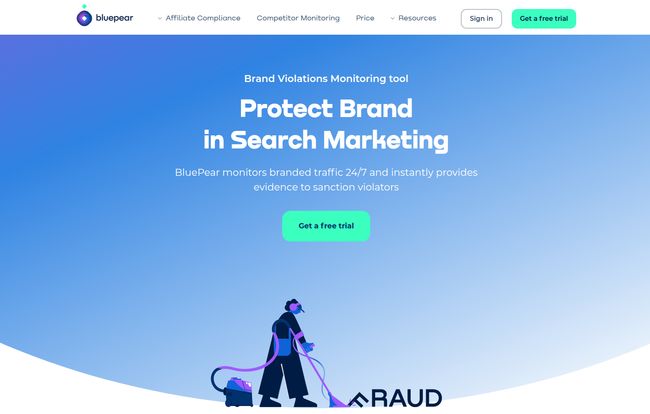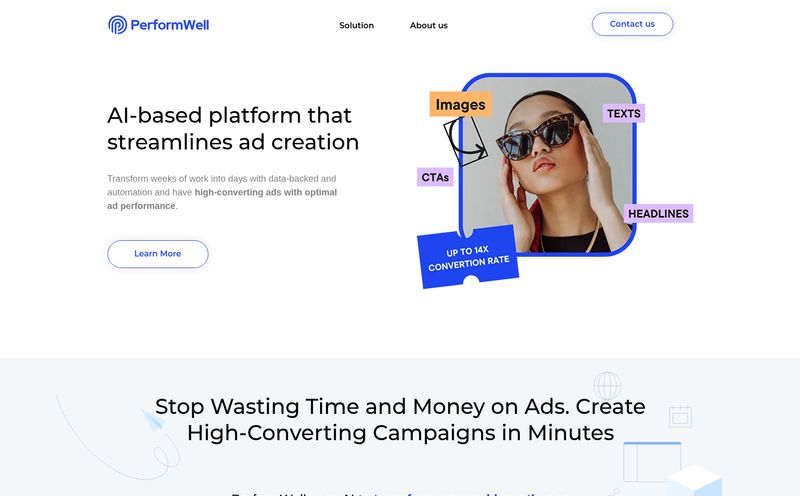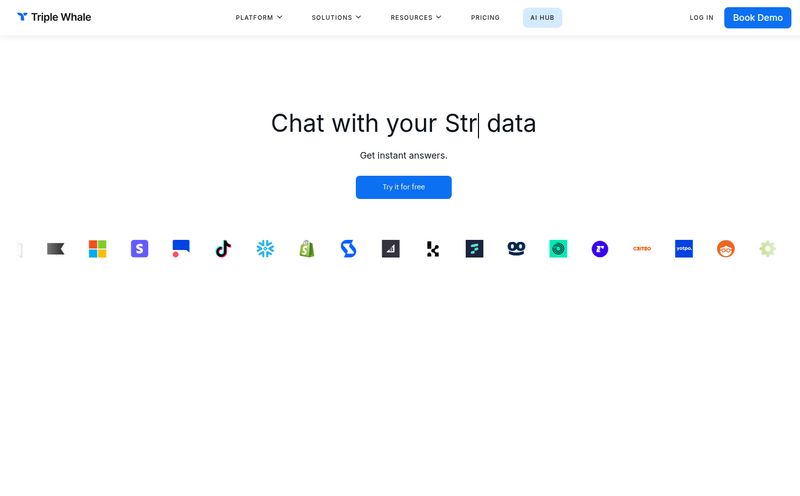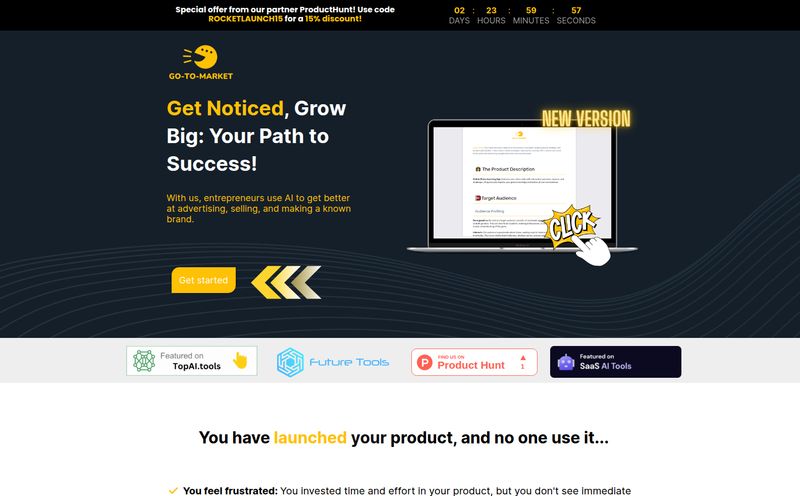We’ve all been there. You’re staring at your Google Ads dashboard, coffee in hand, wondering why your branded campaign’s CPC is creeping up. Your conversion rate is solid, but the cost per acquisition (CPA) is just… wrong. It’s that nagging feeling. The one that says you’re paying more than you should to attract customers who were already looking for you by name. It’s maddening, isn't it?
For years, this has been the quiet, frustrating battle for PPC managers and affiliate marketers. A constant game of whack-a-mole with dodgy affiliates and aggressive competitors bidding on your brand terms. It's a silent drain on your ad spend, a slow leak that can cost thousands, or even hundreds of thousands, over a year. I've personally seen accounts where nearly 15% of the budget was being siphoned off by this nonsense. That's not just a rounding error; it's a new hire, a major campaign, or a hefty bonus. Gone.
So when I heard about a tool called BluePear, which claims to be an AI-powered watchdog for this exact problem, my ears perked up. Another tool, another subscription... I was skeptical. But the promise of automatically sniffing out and providing evidence against these brand vultures? Okay, I’m listening.
First Off, What Even is Brand Bidding (And Why It’s Costing You)
Let's get on the same page. Brand bidding is when someone else—usually a competitor or an affiliate partner who’s breaking the rules—bids on your specific brand name or trademarks in paid search. So when a user searches for "Your Awesome Brand," an ad for "Slightly-Less-Awesome Competitor" or "ShadyCouponSite.com" shows up right above your own organic or paid listing.
Think of it like this: You own a popular coffee shop. A customer specifically asks a taxi to take them to your front door. But on the way, the taxi driver, who's getting a kickback from the cafe next door, says, "Hey, have you tried this other place? They have a 10% off coupon!" and drops the customer off there instead. You just lost a guaranteed sale, and worse, you might have even paid for an ad click that the user never intended to make on a competitor's site. That's brand bidding in a nutshell. It inflates your CPCs, confuses your customers, and directly steals revenue. It sucks.
Enter BluePear: The AI-Powered Watchdog for Your Brand
So, this is where BluePear steps in. At its core, it's an automated system designed to monitor Search Engine Marketing (SEM) for violations against your brand. It’s not just looking for obvious stuff. It uses AI to scan the SERPs 24/7, across different countries, devices, and browsers, hunting for these budget-leeching ads.
The company's website uses this metaphor of a vacuum cleaner sucking up fraud, and honestly, it's pretty spot on. It’s like having a little robotic janitor that constantly sweeps your branded search results, flagging anything that shouldn’t be there. Instead of you or your team spending hours manually typing your brand name into Google in different incognito windows—and let's be real, who has time for that?—BluePear does the heavy lifting.

Visit BluePear
My Favorite BluePear Features (The Stuff That Actually Matters)
A feature list is just a feature list until you see how it solves a real problem. After digging in, a few things really stood out to me as being incredibly practical for anyone in the paid search trenches.
The 24/7 Global Monitoring is No Joke
Brand bidding isn't a 9-to-5 problem. A sneaky affiliate in a different timezone can run their ads while you’re asleep, racking up commissions and driving up your costs, then switch them off before you've had your morning coffee. Manually checking is a losing game. BluePear's ability to monitor everything, everywhere, all the time is its foundational strength. It checks from different cities, on different operating systems, and across mobile and desktop. This isn't just a convenience; it's the only way to get a true picture of what’s happening.
Unmasking the Chameleons with Cloaking Detection
This one is huge. Cloaking is a nasty, deceptive tactic where a fraudster shows one landing page to Google's ad bots to get approved, but shows a completely different page to actual users. They might send the bot to a compliant-looking page, but send a real user to a page full of pop-ups, competitor links, or even a direct affiliate link that hijacks your cookie. Trying to catch this manually is a nightmare. BluePear’s system is specifically built to identify this discrepancy, which is, in my experience, one of the hardest types of affiliate fraud to prove. This feature alone is a massive differentiator.
The Evidence Locker: Reports That Get Action
Here’s the thing about catching a rule-breaking affiliate or competitor: your complaint is only as good as your evidence. It’s not enough to tell an affiliate network, "Hey, I think these guys are bidding on my brand." They'll ask for proof. Screenshots, timestamps, destination URLs, the works. BluePear automates this entire process. It captures the evidence of the violation and packages it into a clean report. This turns a vague complaint into an undeniable, actionable case. You go from tattling to building a legal-style case file, and that’s what gets violators sanctioned and your money back in your pocket.
So, Who is This Tool Really For?
Based on its features, BluePear is definitely aimed at a few key roles:
- PPC Managers: Your main goal is Return on Ad Spend (ROAS). BluePear helps you plug the leak in your branded campaigns, lowering your CPCs and CPAs and making your budget go further. It's about efficiency and performance.
- Affiliate Marketing Managers: You're responsible for keeping your partners in line. This tool is your compliance officer, ensuring affiliates stick to the terms of your agreement and aren’t cannibalizing your other marketing channels.
- Digital Marketing Directors & CMOs: You care about the big picture—brand integrity, budget allocation, and overall marketing efficiency. This tool gives you the oversight to ensure your brand's online presence is clean and your advertising dollars are being spent effectively, not just handed over to rule-breakers.
Let's Talk Money: The BluePear Pricing Breakdown
Alright, let’s get to the question on everyone’s mind: what does it cost? This isn't a $20-a-month browser plugin. It's a professional-grade monitoring platform, and the pricing reflects that. I appreciate that they are transparent about it though.
| Plan | Price per Month | Key Features |
|---|---|---|
| 7-Day Trial | $0 | 20 keywords, scanned 6x daily |
| Light | $169 | 20 keywords, scanned 6x daily |
| Standard | $499 | 100 keywords, scanned 12x daily |
| Advanced | $799 | 300 keywords, scanned 12x daily |
My take? For a small business just starting out, the price tag might be a bit intimidating. However, for any company spending a decent amount on paid search (think five or six figures a month), the cost is almost certainly a fraction of what you're already losing to brand bidding. The 'Standard' plan, for example, could pay for itself by catching just one or two serious violators. Framing it as an investment in budget recovery rather than just another software cost is the right way to look at it. Plus, the 7-day free trial makes it a no-brainer to at least see if it finds anything fishy.
The Not-So-Perfect Bits (A Balanced View)
No tool is perfect, and it’s important to be realistic. The two main considerations with BluePear are pretty straightforward.
First, the price. As I mentioned, it’s a professional tool for a professional problem, and it's priced accordingly. If you have a very small ad budget or don't face significant competition, it might be overkill.
Second, it’s still reliant on AI. The AI is powerful, but it's not a sentient being (yet!). You still need a human brain—yours—to look at the flagged violations, interpret the context, and decide on the course of action. It's a powerful assistant, not a complete replacement for a sharp marketing manager. You can't just set it and forget it entirely; you have to use the data it gives you.
My Final Verdict: Is BluePear Worth The Investment?
So, here’s the bottom line. If your brand has any level of recognition and you're actively spending on paid search, you are almost certainly dealing with some form of brand bidding, whether you know it or not. The question is how much it's costing you.
BluePear is a highly specialized, powerful weapon in the fight against this specific, expensive problem. It automates a tedious and often impossible task, providing the concrete evidence you need to actually do something about it. For mid-to-large size advertisers, the ROI is not just possible, it's probable. The amount you save by cleaning up your branded SERPs could easily dwarf the subscription cost.
If you're a smaller operation, start with the free trial. Let it run for a week. The results will tell you whether you have a problem big enough to justify the investment. For everyone else who has ever felt that frustration of watching your brand CPCs climb for no good reason, I’d say BluePear is absolutely worth a serious look.
Frequently Asked Questions About BluePear
- 1. Does BluePear monitor search engines other than Google?
- The platform focuses on Search Engine Marketing (SEM), which primarily means Google Ads and Microsoft (Bing) Ads, as these are where most brand bidding violations occur. It's tailored for the biggest players in the paid search space.
- 2. How difficult is it to get started with BluePear?
- Based on their materials and industry standards for tools like this, setup is designed to be straightforward. The info says they offer user guidance and ongoing support, including a personal client specialist. You'll likely just need to provide the keywords you want to monitor and specify your rules.
- 3. What kind of evidence does BluePear actually provide?
- It provides detailed, actionable reports. This typically includes screenshots of the offending ad as it appeared on the SERP, the display URL and final destination URL, the time and date the ad was seen, and the geographic location and device it was detected on. This is the kind of concrete proof affiliate networks need.
- 4. Is BluePear only for affiliate program abuse?
- Not at all. While it's fantastic for affiliate compliance, it's equally effective for competitor monitoring. You can use it to catch competitors who are using your trademarked brand name in their ad copy, which is often against Google's policies.
- 5. Can I export the data for my own records?
- Yes, the platform offers customizable CSV and Excel exports. This is perfect for internal reporting, sharing with legal teams, or uploading violation data to affiliate network portals.
Conclusion
At the end of the day, protecting your brand online is not a passive activity. It requires vigilance. In a world of increasing automation, it only makes sense to fight fire with fire. Don't let brand vultures and rule-breaking partners eat away at your hard-won marketing budget. Tools like BluePear give you the power back, turning you from a victim into the sheriff of your own brand. It's one of the sharpest, most focused tools I've seen for this job, and in the world of CPC and traffic generation, a sharp tool is worth its weight in gold.
Reference and Sources
- BluePear Official Website
- BluePear Pricing Page
- Google Ads Trademark Policy
- A Guide to Brand Bidding from Search Engine Land



